
Poetry Quoetry
This month, to celebrate a year of voicing opinion, we asked our reviewers to tell us a bit about how, when and why they came to write / review poetry, and what they do when they just can’t get on with writing a Friday Poem review.
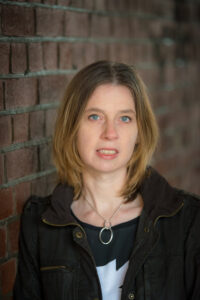
I got into poetry at school. I remember one hot sweaty day my English teacher saying that kind of weather always made her think of murder. Then she handed out Robert Browning’s ‘Porphyria’s Lover’. I loved it! A less happy school memory of poetry is reciting Charles Causley’s ‘Timothy Winters’ at a primary school harvest supper in our village hall. I was reading it with my friend and she got the giggles half way through, and then I did. The headmaster sort of bundled us off the stage. Can’t say I am entirely confident reading in public to this day!
I relish poems with a bit of a surreal twist, anyone from Thomas Lux, Charles Simic and James Tate to Caroline Bird, Luke Kennard and Mark Waldron. I love the idea that poems can create brilliantly weird worlds that seem entirely relatable – more real than your normal life. But I also love really simple quiet poems that just pick out a few everyday details and change how you look at everything.
I hope reviewing will make me more disciplined and critical reader and inspire me to write lots more poems. Failing that at least I get a few free books! I don’t have any overarching view on contemporary poetry or any manifesto of what poetry should be about. And to be honest I don’t feel in any way qualified to pronounce on such things. I see reviewing as being a conversation between readers. Perhaps over an imaginary glass of wine and a few crisps.
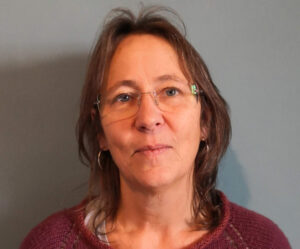
I like poetry that keeps the lid on AND lets the pig out. My favourite single line of poetry is: “Thus, though we cannot make our sun / stand still, yet we will make him run” – Andrew Marvell, To His Coy Mistress. Or “Something there is that doesn’t love a wall” from Robert Frost’s ‘Mending Wall’.
I started reviewing with Nell at Sphinx many years ago, and reviewed briefly for Warwick Review and PNR before I had a bit of a hiatus. I’m getting back in the saddle now, and loving it.
On reviewing, I’m with Maitreyabandhu when he says critics “need to be genuinely open to new voices. In other words, they need to be authentically independent.” When reviewing I try to offer a genuine, well-informed and intelligent response to a book, and write about it in a creative and interesting way. And to position the review appropriately – a big name poet has plenty of self-regard and so can take a bit of prodding. Some poets starting out need a bit of encouragement, so I would emphasise their strengths.
When I’m trying to write and failing I generally spend time playing Clash of Clans on my phone. We have a family clan called Fluffy Unicorn which has been in existence for about ten years. I run six bases. My TH8 base is actually called ‘The Friday Poem’. My TH14 base is the highest in the clan. I’m inappropriately proud of this.
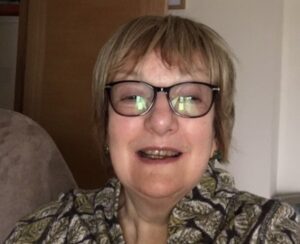
I found poetry through the Open University creative writing courses which I studied after retirement from teaching. My tutor recommended I pursue the poetry option for the advanced writing course, and I followed this with a Masters (distinction) at Manchester Metropolitan University. It’s a passion now, a way of daily life, and has brought me many friends, and opportunities to publish.
I’m drawn to lyrical, observational poetry, I think, because it appeals to my romantic nature and social history perspective on life. I love musicality in a poem, and subtle rhyme. Surprising imagery too. I don’t have a favourite single line of poetry but one poem I do hold in my heart is Raymond Carver’s ‘Late Fragment’: “And did you get what / you wanted from this life, even so? / I did. / And what did you want? / To call myself beloved, to feel myself / beloved on the earth.” Of other poets, two of many of my favourites are John Glenday and Imtiaz Dharker.
As to reviewing, I’ve been doing it for about five years. I learn much from close reading other writers’ work and know how important it is to support them. I try to focus on the positive aspects of a collection and enjoy poetry I might have initially resisted.
What’s my displacement activity? Walking my greyhound. That’s when ideas often come to me. Also having a snooze!

I had a succession of very engaging English teachers. For ‘A’ level, our texts included Robert Lowell and Donne, both of whom I really enjoyed. At the same time, one of my brothers was studying American Studies at university and had a module on American poetry, which encompassed William Carlos Williams and the Beats, and he went on to do an MA in American Poetry, with a then-unheard-of specialism in Gary Snyder. His enthusiasm, and books, were gateway drugs – I read all sorts. When I then went off to university, the poetry section in the library was like Aladdin’s cave and I filled my boots, much to the detriment of my actual studies.
I like poetry which entertains me as much as that which moves me – those aren’t mutually exclusive, of course. A favourite sentence is from Robert Lowell’s ‘For the Union Dead’: “Everywhere, / giant finned cars nose forward like fish; / a savage servility / slides by on grease.” Or pretty much anything by Geoff Hattersley, for example, “Talking to him was like selling snails from door to door”, from ‘Ride’.
Reviewing has multiple benefits. It gives potential readers a good idea of what the publication contains. It gives the author of the publication some recognition and feedback. It’s a necessary part of the wider poetry community. It helps me to improve as reader and writer by considering someone else’s poetry with an intensity which I might otherwise not bring to bear in my day-to-day reading. And it keeps my (metaphorical) pen flowing.
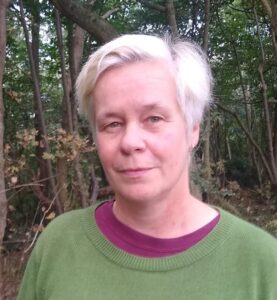
I loved it studying English at school. I remember being cast as First Voice in Under Milk Wood in the school play when I was about twelve and being mesmerised by the language; then falling completely for Keats’ ‘Ode to a Nightingale’. I did English at uni, and a relative gave me the Complete TS Eliot to take with me: I was blown away by Prufrock. I did my uni dissertation on Edwin Muir: spent a summer on Orkney, in the run-up. And then I lived in my second year in Palmers Green where I wrote:
Stevie Smith spent all of her years but three
in Palmers Green. I shall spend none but one.
I love clear, accessible, deep, insightful, emotionally rich poems. Poems which speak to me. These might be written by anyone from Chaucer on! I like them because they make me feel less alone. One line that has always comforted me is: “I was much too far out all my life / And not waving but drowning.”
Once I’d been published myself (as a poet) I knew how much I appreciated reviews of my work. So, it’s a kind of virtuous circle, I think, for me: a way of passing it on. But it’s also enjoyable and satisfying in itself. Poetry reviews form and operate in that strange room between the poet’s words, and my own. I like spending time respectfully in that space.
PS Happy birthday to TFP. Love the fact we were born on the same day!

How did I get into poetry? Externally, having librarians for parents helped. Temperamentally it’s more complicated – something to do with always having felt a great love for the world but also that I’m in exile from it.
I like poetry that is both religious and impious. These are also what I think of as old left-wing values. Many modern lefties I find irreligious and pious, which amplifies the feeling of exile I just mentioned. When I read a poem I’m hoping primarily for aesthetic delight and a direct connection to reality and feeling.
Like Tadeusz Różewicz, I also look to poetry for practical help. With life, I suppose. Anchorage. And always in hope that the poem will allow me to see my own life and the world in general with greater clarity and honesty.
I have been reviewing poetry for twelve years, on and off (mostly off). I do it for a combination of reasons. I only think through writing, so reviewing is a good way of working out who I am, and testing my own attitudes for rightness and balance. Obviously, you learn more about the world too, and then of course there’s the sheer pleasure (almost a love-affair proxy, at times) of meeting someone else’s mind and skill, and finding yourself delightfully readjusted by it.
What’s my favourite displacement activity which I do when I should be writing? At the moment, YouTubing old interviews from the Dick Cavett show.

I took a fairly predictable teenage route into poetry, discovering Dylan Thomas and falling under his spell. I had an English teacher at high school who was a keen poetry reader, and she ignited my interest in writing it. She led me to Michael Longley, still a favourite.
As a poet I prefer lyric poetry. I have a lot of time for confessional poetry and American stuff, though not necessarily Beat or Black Mountain school. I also enjoy extinct movements such as the New Apocalypse which was really the disowned precursor of the Movement (which, apart from Larkin, is a sort of smug, arid university poetry I’ve never enjoyed).
Reviewing is about giving the book a fair trial and the attention it needs but perhaps doesn’t receive. Once in a blue moon I get paid for my reviews, but that isn’t the reason I do it, nor is it for free review copies. I think it’s really important for poets to be good critics as well and you should cut your teeth early. The most satisfying thing is to get a message from the poet under review saying they feel I really ‘got’ what the book was about.
I procrastinate by playing guitar, chopping wood, going bottle digging or mudlarking. I rearrange the library, read booksellers’ catalogues, go to the pub, go down an internet rabbit hole. Walking is usually best for freeing up ideas for reviews and poems – perhaps the rhythm of movement is its own meter, you find that sentences begin to form out of nowhere.

While studying Comparative Literature at Queen Mary University of London I regularly performed on the spoken word circuit in London, competed in poetry slams, and even reached the UK Poetry Slam final in 2015. Winning really wasn’t important, which is good, because I didn’t. But I felt galvanised by the type of people doing what I was doing. At the same time, I was editing the Queen Mary Review and organising and compering spoken word poetry events at QMC’s Ground Cafe with headline acts like Joelle Taylor, Vanessa Kisuule and Bridget Minamore.
Being the Spoken Word Poetry Editor of The Friday Poem has given me a chance to re-engage with the art form. Reviewing and profiling some of the poets I’ve followed and loved for years – Joelle Taylor, Kae Tempest, Holly McNish, Vanessa Kisuule – has been a joy. To me, they’re some of the most admirable people, pouring their hearts and souls and energies and ideas into little books. And they’re doing it for you. For us.
I review them because someone might read a review and think, ‘I’ll give that a go’. Or the poet themselves will read a review and go, ‘Yes!’ Or even, ‘No!’. Having someone engage with your art – feel something, think something – was always, for me, the thing that kept me ticking, that validated me as an artist. So if my review encourages you to read a book of poetry, or to book a gig, then that’s me set.

At primary school, we had a teacher who encouraged us to write poems, and I realised I was relatively good at putting words into action. Soon, I was going to the library and causing a nuisance by sitting on the floor in Ottakar’s bookshop in Lincoln, looking through the poetry books, and it just sort of proliferated from there.
I like anything I think is good! It seems many poets at present have barely read anything published more than five minutes ago, and of course they usually keep firmly within contemporary camps and confine their reading to those camps. I’ve no interest in that. I won’t claim to read Old English poetry for pleasure, exactly, but I strongly considered focusing on medieval literature for my MA, and would probably have continued in that vein academically if I’d done so – and no doubt ended up without an academic career because nobody seems to want to teach that stuff anymore.
I’ve been reviewing since 2008. I like the engagement, that it makes me read things I might otherwise miss out on. I’ve no difficulty saying why I think something doesn’t work, though, and that honesty helps me as a poet in some way, I’m sure, even if it probably also gets me blackballed now and again. While reviewing, I want to get across what the book is like, while trying to cram the square peg of my subjectivity into the round hole – or elusive hole – of objectivity; and to do so uncowed by patronising modern mores.
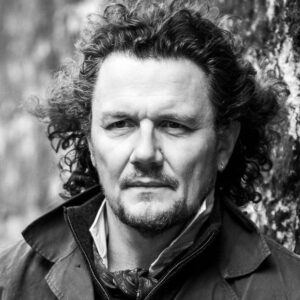
It’s hard to remember a time when poetry didn’t delight me. I’m enchanted by the possibilities of language. Poetry seems to be the best way of exploring, and occasionally expanding, these. I like poetry which speaks honestly about our relationship with the landscapes which we create and inhabit, so Clare, Thomas, Oswald, Machado, Lorca, Heaney. I’ve lived in the country most of my life. It deserves a clear eye. I also like the Romantics, especially Coleridge and Keats. My favourite lines of poetry ever are: “Farther and farther, all the birds / Of Oxfordshire and Gloucestershire”.
I live a few miles from Adlestrop, this line often comes to mind on hot summer days when I’m out in the fields which surround us.
At school I enjoyed the challenge of responding to poems. The fact that I could rely on an unseen poem being one of the exam questions also meant I could get away with less revision. So I worked at thinking about what poems do. I still enjoy doing that, and had a couple of OPOI reviews published on Sphinx before being invited to review for FRIP in 2021.
I think it’s important to show what seems remarkable and enjoyable about a book. I don’t review work that I can’t find a way into. What would be the point? Anyone can be pissy, and no collection is perfect. Discovering, and finding a way to communicate, what the writer has done well is much more interesting and rewarding.
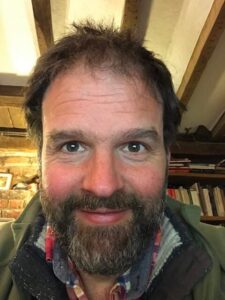
I’ve enjoyed poetry since studying it at school – the War Poets and Elizabeth Jennings left a particular impression – but it became far more central to my life in 2009 when my six month old son died after six operations in three hospitals. In the fight between poetry, religion, and alcoholism, poetry won on points. And from then on it seems to have been a necessary thing rather than a purely enjoyable thing.
I like poetry that is not confessional – which is not to say that I dislike a lot of poetry that is confessional, but poetry-as-confession (and by extension the poet-as-the-poetic-‘I’) seems to dominate to an extent that I’ve come to feel a little resistant to it. It’s the mode that brought me to poetry, and it is perhaps the one which has the most therapeutic value for poet and reader; but I think it can be limiting, and I’m tempted to say dangerous, to assume that the voice of a poem is the voice of the poet. Both readers and poets often appear to make this assumption.
The line that comes into my head most often is Wordsworth’s “The world is too much with us; late and soon, / Getting and spending, we lay waste our powers” – the ‘world is too much with us’ I find returning to me endlessly.
When reviewing, I want to remind readers that a work of poetry is a point of departure not of arrival.

I got into poetry by accident. I remember writing some sort of rhyming thing around the age of five. It was based on a song called ‘Bobby Bingo’. I wrote it in pink felt tip in my gran’s outhouse while sitting on felt tiles. After that I was in. At secondary school we read Ted Hughes’ ‘Pike’ and the War poets, and I fell for the Liverpool Poets after I found a copy of ‘The Mersey Sound’ in Mr Phillips’ English class.
If I have to choose a favourite line I’ll take “I need you more than want you, and I want you for all time”, from Wichita Lineman by Jimmy Webb. It’s not officially a line of poetry, but I wish I’d written it.
I’ve been reviewing for about four years. I started reviewing for Sphinx as a way to broaden my horizons, get to grips with my own work, and to get better. Reviewing felt like a good way to engage with work more than just reading. I still do it for those reasons. And the books, especially for the books.
When reviewing I want to keep hold of the fact that someone has taken their time to write this. The OPOI guidelines are ingrained in me to find something positive. I always look for that. Beyond that, it’s a case of remembering the author and the ‘I’ on the page aren’t always the same
I find Twitter a hard habit to kick. At present stroking our new kittens is also pretty irresistible.

